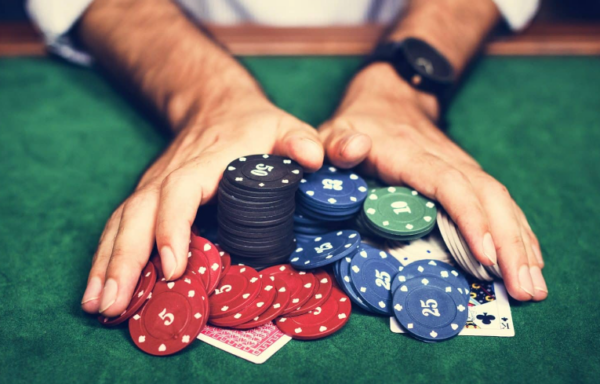Gambling represents a complex interplay of risk, reward, and human psychology, appealing to deep-rooted desires and emotions. This fascination can stem from various psychological needs and external factors, driving individuals to seek the thrill it provides. While often perceived as a mere form of entertainment, gambling goes much deeper, tapping into the psychological makeup and societal conditions that shape human behavior. In exploring the reasons behind the urge to gamble, it is crucial to understand not only the inherent lure of winning and the thrill of risk but also how gambling serves as an emotional response and a reflection of personality and societal influences.

Emotions and Hormones
The interplay between emotions and hormones is a crucial element in understanding why people are drawn to gambling. When individuals engage in gambling, the uncertainty and risk involved naturally trigger the production of adrenaline, a hormone associated with the body’s ‘fight or flight’ response. This release of adrenaline leads to heightened sensations, making the experience intensely exhilarating. The gamble itself, with its unpredictable nature, stimulates a neurological response that can offer a natural high. This biochemical reaction is not just about the thrill of potential gain but also the visceral, emotional experience that gambling evokes. For those looking to start their gambling journey, exploring options like a Richard Casino no deposit can be a way to experience the excitement without immediate financial commitment.
The Desire to Win
At its core, the desire to win is a fundamental human instinct. In gambling, this desire is magnified by the allure of financial reward and the symbolic significance of ‘beating the odds.’ While some may perceive gambling as a potential avenue to wealth, it’s important to recognize it primarily as a form of entertainment. The excitement derived from the act of gambling often stems more from the process and the possibility of winning rather than the actual winnings. This creates a powerful emotional engagement that can be as rewarding, if not more so, than the financial outcomes.
A Tool for Dealing with Stress
For many, gambling acts as a temporary escape from daily stresses and life’s routine. The immersive nature of gambling can provide a distraction that allows individuals to disconnect from their problems and engage in an activity that demands their full attention, thereby reducing their levels of anxiety. However, the use of gambling as a stress relief tool can be double-edged; while it may provide temporary reprieve, it can also lead to a dependency if used consistently as a coping mechanism.
Influence of External Circumstances
External factors such as financial situation, personal relationships, and overall stress levels can significantly influence an individual’s decision to gamble. Economic pressures, for instance, can drive individuals to gamble out of a desire to quickly improve their financial situation. Meanwhile, personal relationships and social environments can either encourage or dissuade gambling behaviors. These external circumstances not only affect the frequency of gambling but also the attitude towards it, with some viewing it as a legitimate form of leisure and others as a risky or even desperate act.
Are cultural factors important in shaping the ‘gambler’s mentality’?
Our beliefs, values, and attitudes largely depend on the people we communicate with. In the context of gambling, the environment and cultural environment can significantly influence a person’s attitude to gambling.
In addition, practice shows that during periods of economic growth, people feel more confident in investing some money in gambling. And vice versa, they form an unhealthy ‘gambler’s mentality’ when they perceive games as a possible source of income.
The Appeal of Uncertainty
One of the primary attractions to gambling is the inherent unpredictability of its outcomes. The randomness associated with these games can evoke strong emotional reactions, including excitement and anticipation. This sensation can become addictive for some, as the brain releases dopamine—a neurotransmitter linked to pleasure and reward—during moments of uncertainty. The pursuit of this feeling can lead some individuals to continually seek out gambling experiences.
Social Influences on Gambling Behavior
Social environment and cultural background significantly shape gambling behaviors. For example, in communities where gambling is seen as a legitimate form of entertainment or a social activity, individuals may be more likely to engage in betting activities. Peer influence can reinforce gambling habits, especially where big wins are celebrated publicly, which can amplify the allure of potential rewards.
The Role of Gambling in Stress Relief
Many individuals turn to gambling as a form of escape from daily stresses and anxieties. Engaging in gambling activities can provide a temporary distraction from one’s problems and a way to relax. However, this form of stress relief can become problematic if it turns into a primary coping mechanism, as it can lead to neglect of more effective and healthier stress management techniques.
Cognitive Benefits and Risks
Engaging in gambling can also have cognitive benefits. For instance, strategy-based games like poker require concentration, pattern recognition, and strategic planning, which can enhance mental acuity and critical thinking skills. However, the risk of developing unhealthy gambling habits that can negatively impact cognitive functions and lead to impaired decision-making and problem-solving abilities is also significant.
Responsible Gambling
To harness the benefits and mitigate the risks associated with gambling, the concept of responsible gambling is vital. It involves understanding the odds, setting limits on time and money spent gambling, and being aware of the signs of problem gambling. By adhering to these practices, individuals can enjoy gambling as a harmless entertainment form without adverse effects on their finances or mental health.
Conclusion
Gambling presents a dual nature of both risk and opportunity. It is not merely a source of entertainment but also a complex activity that can influence cognitive and psychological processes. By promoting responsible gambling practices and understanding the factors that drive gambling behaviors, individuals and communities can better manage the impacts of this activity.









